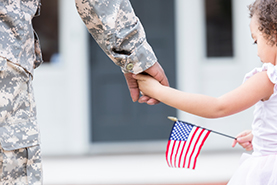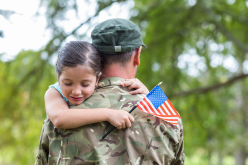Caring for America's Veterans

Hundreds of thousands of veterans return from conflict having experienced trauma; many struggle with PTSD and some are at risk for homelessness. We can serve veterans better by developing the best trauma-informed care practices, engaging families, and making the physical and mental well-being of service men and women a priority.
Trauma-Informed Leadership Training (Project)
In support of the U.S. Department of Defense's mission to provide combat-credible military forces needed to deter war and protect the security of our nation, AIR provides expert consultation on the development of evidence-based, trauma informed leadership trainings. The trainings help military leaders understand how to best support Service members who may have experienced trauma and improve force resiliency and mission readiness.
 How Public Datasets Can Address Data Obstacles in Pay for Success: A Demonstration for Veterans with Service-Connected Disabilities (Brief)
How Public Datasets Can Address Data Obstacles in Pay for Success: A Demonstration for Veterans with Service-Connected Disabilities (Brief)
As part of its Pay for Success work, AIR developed a workaround to common data obstacles these projects face. AIR was contracted to develop the evaluation design for the San Diego-based Project (re)Launch, which sought to improve employment and health outcomes for veterans with service-connected disabilities by providing intensive case management and wraparound supports.
Informing Improved Recognition of Military Learning (Project)
With more than 1 million veterans having used the Post-9/11 GI Bill benefits, it is critical to better understand the challenges veterans face—and paths institutions could take to address those challenges by better recognizing their learning. This project examines veterans’ experiences with, and perceptions of, having their military learning recognized by postsecondary institutions as they pursue a credential.
Trauma-Informed Care for Organizations Serving Homeless Female Veterans (Project)
With advances in awareness of the prevalence and impact of trauma in the lives of women veterans, trauma-informed care is now seen as a best practice to support recovery. Funded by the Bristol-Myers Squibb Foundation from 2012 to 2014 as part of its Mental Health and Well-Being Initiative for returning veterans and families, this project was a multi-site demonstration project designed to build the capacity of veteran-serving agencies—particularly those serving women veterans—to adopt a universal, organization-wide approach to understanding and responding to trauma.
Project (re)LAUNCH: San Diego Veterans Employment Pay for Success Initiative (Project)
The transition back to civilian life is difficult for many veterans. Often times, military training does not directly translate to civilian skills and available jobs back home. Addressing these challenges is the central aim of the San Diego Veterans Employment Pay for Success Initiative, Project (re)LAUNCH, a partnership of the San Diego Workforce Partnership; Third Sector Capital Partners, Inc.; 2-1-1 San Diego; and AIR.
 Addressing Post-Traumatic Stress Disorder Among Veterans: Learning What Works (Project)
Addressing Post-Traumatic Stress Disorder Among Veterans: Learning What Works (Project)
An estimated 500,000 veterans will return home with post-traumatic stress disorder, or PTSD—a debilitating illness that is often marked with anger, depression, physical pain, disturbed sleep, social isolation, and thoughts of suicide. In response, AMVETS has created the Warrior Transition Workshop, conducted over a two- to five-day period. It is confidential, and is structured in a training style familiar to military personnel with a hands-on, peer-to-peer approach that includes a well-crafted blend of military history, legend, and ritual.
Community Circles of Support for Veterans' Families (Project)
The return of American men and women in uniform rivals the scale of World War II demobilizations in some communities. In partnership with the National Center on Post Traumatic Stress Disorder, the National Center on Family Homelessness created Community Circles of Support for Veterans Families, a multi-site demonstration project designed for use by community-based organizations.
Community Circles Strength at Home: Central Valley, CA (Project)
Veteran status has been associated with increased rates of interpersonal violence, with veterans perpetrating violence up to three times as much as civilians, which can be largely attributed to combat-related post-traumatic stress disorder or to a prior history of trauma. Strength at Home is a relationship-strengthening intervention for veterans/service members and their families and friends designed to address conflict, anger, and readjustment to civilian life after deployment.
Chicagoland Women Veterans Employment Study (Project)
Recently, the social and cultural needs of women veterans, such as the reintegration of women veterans into civilian culture, gender-specific family concerns, and post-separation support, have begun to receive greater attention. The goals of the Chicagoland Female Veteran project were to compare male and female veteran unemployment and underemployment, understand the dynamics of homelessness among unemployed female veterans, and explore effective service interventions for women veterans.
Engaging Veterans and Families to Enhance Service Delivery (Toolkit)
The National Center on Family Homelessness, with funding from the Walmart Foundation, created Engaging Veterans and Families To Enhance Service Delivery: A Tool Kit for Community-Based Organizations, offering tools and resources to improve the effectiveness of community-based organizations’ staffing, program design, delivery, and outreach and engagement of veterans and their families and friends.
Veterans’ Health Administration Survey of Healthcare Experiences of Patients (Project)
AIR assisted the Veterans Health Administration's Office of Quality Performance when they changed the content of their Survey of Healthcare Experiences of Patients to surveys modeled on the CAHPS Inpatient and Clinician-Group surveys.

